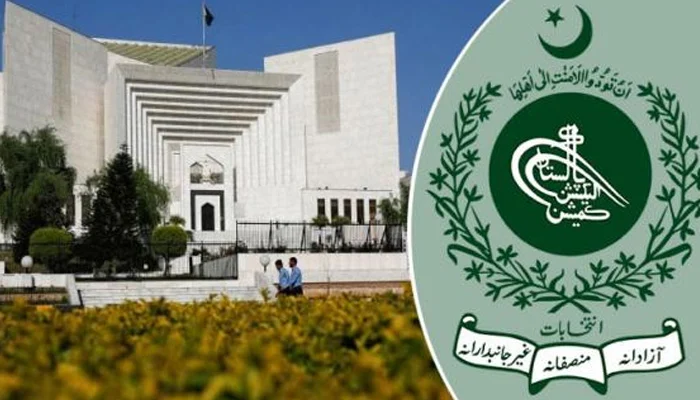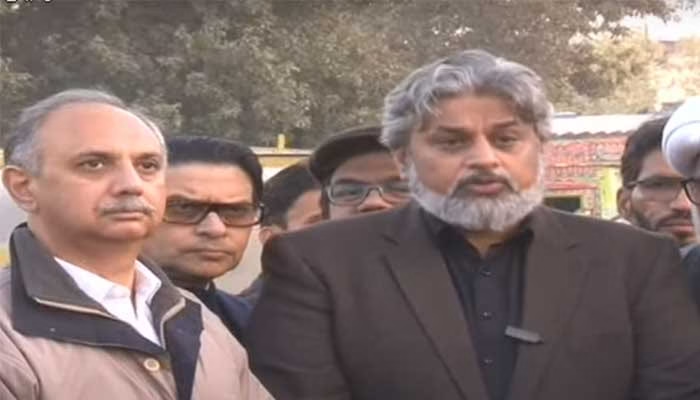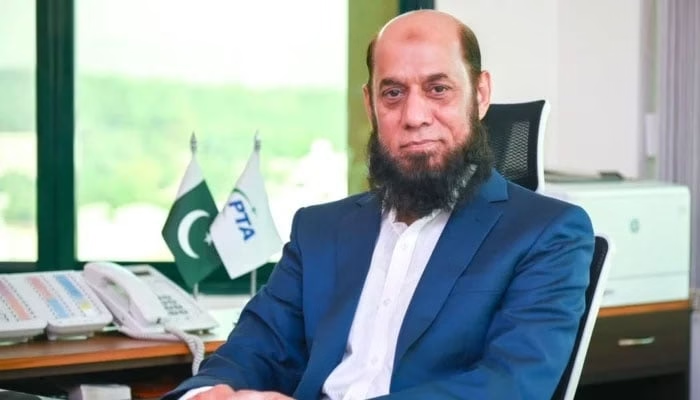In a significant development in Pakistan’s political landscape, the country’s Supreme Court has issued an order directing the President to consult with the Election Commission regarding the date for the upcoming general elections. This directive comes after a hearing lasting 90 days in the Supreme Court, with a three-member bench led by Chief Justice of Pakistan, Justice Faiz Isa, and including Justice Athar Minallah and Justice Ameenuddin Khan.
During the hearings, the Chief Justice made it clear that the Supreme Court’s primary focus is to ensure that elections are held as scheduled and that the date for the general elections is determined promptly. He emphasized that the court is not interested in getting involved in any other disputes and expects the Election Commission and the President to work together to set the election date.
The Election Commission was given until February 11th to finalize the date for the general elections, as decided during the Supreme Court’s hearings.
This ruling comes amid a backdrop of political tensions and legal challenges related to the election date. The Pakistan Tehreek-e-Insaf (PTI), the ruling party in the country, had initially sought to limit the time available for the elections to 90 days, in line with the constitutional requirement that elections must be held within 90 days of the dissolution of the assemblies. However, this decision was met with resistance from various political parties and stakeholders, leading to a prolonged legal battle.
During the proceedings, the Chief Justice questioned which party would present its arguments first. Ali Zafar, a lawyer representing the PTI, expressed the party’s willingness to present their case first. He argued that PTI had already limited the time for elections to 90 days, complying with the constitutional requirement.
The Chief Justice, however, pointed out that the 90-day limitation was no longer effective after the previous hearings. He had earlier indicated that it was no longer feasible to hold elections within 90 days.
The legal debate centered around the fundamental rights of political parties and the need for timely elections. Attorney General and other parties did not raise any objections regarding the fundamental rights at stake.
Ali Zafar argued that if elections are delayed, it would not only affect the parliament but also the legislative process, emphasizing that setting the election date and providing a schedule were distinct matters. He noted that the Election Commission Act governs the issue of specifying the election date, and the President had written a letter to the Election Commission seeking consultation.
This recent development reflects the crucial role of the Supreme Court in ensuring timely and fair elections in Pakistan. The court’s directive to the President to consult with the Election Commission and provide the necessary approvals underscores the importance of upholding the democratic process in the country. It is a significant step toward resolving the legal and political disputes regarding the general election date.
The Supreme Court’s order also aims to expedite the process and bring clarity to the election timeline. The directive to obtain signatures from all relevant parties involved, including the President and the Election Commission, ensures transparency and accountability in the decision-making process.
This decision comes at a critical time for Pakistan, as the country prepares for its general elections. The consultations between the President and the Election Commission are expected to lead to a final decision on the election date and schedule. The Supreme Court’s involvement and commitment to upholding the constitutional mandate for timely elections contribute to the stability and credibility of Pakistan’s democratic system.
The Pakistan Supreme Court’s order for the President to consult with the Election Commission regarding the general election date is a pivotal development in the ongoing legal and political disputes surrounding the elections. It underscores the court’s commitment to upholding democratic processes and ensuring timely elections in the country. The upcoming consultations between the President and the Election Commission are expected to provide clarity on the election timeline, resolving a critical issue in Pakistan’s political landscape.
The Supreme Court of Pakistan has recently been grappling with a constitutional conundrum surrounding the responsibility for setting the date of the upcoming general elections. The issue arose when the Chief Justice, Justice Qazi Faiz Isa, sought clarification from President Arif Alvi regarding his role in the matter. The court’s hearings shed light on the constitutional division of responsibilities between the President, the Election Commission, and the government, and the implications of any lapses in this regard.
The controversy began when President Arif Alvi wrote a letter in which he suggested that the court could also examine the election date, indicating a potential desire to have the Supreme Court weigh in on the matter. However, this letter lacked a specific election date, raising questions about the President’s constitutional obligations.
During the court proceedings, lawyers representing Pakistan Tehreek-e-Insaf (PTI), the ruling political party, contended that the President had consulted and fulfilled his constitutional responsibilities by addressing the issue of setting an election date. Chief Justice Qazi Faiz Isa, however, expressed concerns that the President’s letter did not specify a date and wondered if the President had fulfilled his constitutional obligations adequately.
One of the significant points of contention during the hearings was the President’s timing in writing the letter to the Election Commission on September 2nd. Chief Justice Isa pointed out that the assemblies had already been dissolved on August 9th. This led to the crucial question of why the President did not correspond with the Election Commission on August 15th when this dissolution occurred. The Chief Justice raised concerns that the President may not have fulfilled his constitutional responsibilities entirely in this matter.
In response, Ali Zafar, a PTI lawyer, suggested that the President could provide the election date within 90 days, and it was not necessary to consult, implying that the President could exercise his constitutional authority to set the date.
The Chief Justice urged the Election Commission to consult with the President promptly, indicating that the court was inclined to seek a resolution to this matter.
Lawyer Ali Zafar insisted that the President had been clear in the letter, but Chief Justice Isa questioned whether the President had conveyed the election date and whether he had made use of Article 186, which allows the President to seek advisory opinions from the Supreme Court.
A pivotal moment in the proceedings was when Ali Zafar, representing PTI, read the President’s letter aloud in court. At this point, Justice Ata Minallah inquired if the President had responded to the Election Commission’s letter dated August 24th.
The Chief Justice underscored the need for a clear statement from the President on the election date. The President’s actions had implications for the constitutional order and the credibility of the electoral process.
The President’s role came under further scrutiny when Justice Aminuddin Khan questioned why the President had not announced the election date even if the Election Commission did not request consultation. The Court’s inquiry aimed to clarify whether the President had fulfilled his constitutional duties regarding the election date.
Ali Zafar insisted that the President had the authority to set the election date, emphasizing the constitutional responsibility of both the President and the Election Commission.
One critical point of debate revolved around why the President had not announced the election date. The Court probed the President’s timing and his interaction with the Election Commission. Ali Zafar argued that the President was following the Constitution and his obligations to ensure a fair and transparent electoral process.
Chief Justice Isa raised questions about the President’s decision to consult or communicate the election date. He stressed that the President had not specified a date in the letter, raising doubts about the extent of the President’s constitutional obligations.
During the proceedings, Sajid Swati, representing the Election Commission, clarified that the elections were scheduled for February 11, and the process of constituency delimitation would be completed by November 30. This statement underscored the urgency of the matter, as the Court sought to determine the proper procedures for setting the election date.
The hearings revealed a complex constitutional and procedural issue that the Supreme Court of Pakistan must address. The key questions are whether the President has fulfilled his constitutional obligations regarding the election date, what role the Election Commission plays in this process, and the implications of any lapses in this regard. The resolution of this matter will have significant ramifications for the upcoming general elections in Pakistan, as the country navigates its democratic processes and constitutional framework.



